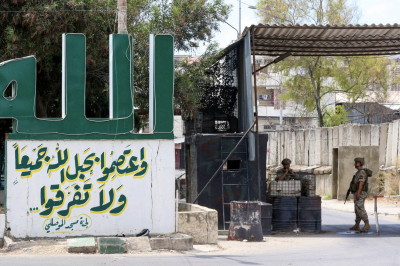Smoke billows from Ain al-Hilweh Palestinian refugee camp, in the southern coastal city of Saida, during clashes between Fatah and Islamist fighters, July 30, 2023. (Credit: Mahmoud Zayyat/AFP)
BEIRUT — Saudi Arabia called on its citizens to
quickly leave Lebanese territory and to avoid approaching areas
where there have been armed clashes, the Saudi embassy in
Lebanon said in a statement posted late Friday on X, formerly
known as Twitter.
The kingdom did not specify which areas in Lebanon that it was advising its citizens to avoid.
The embassy stressed "the importance of adhering to the Saudi travel ban to Lebanon," the statement added.
Kuwait also issued an advisory early Saturday calling on Kuwaitis in Lebanon to stay vigilant and avoid "areas of security disturbances" but stopped short of asking them to leave the country, according to a statement by the Kuwaiti Foreign ministry posted on X.
On Aug. 1, the United Kingdom also updated its travel advice for Lebanon, advising against "all but essential travel" to parts of Lebanon’s south near the Palestinian camp of Ain al-Hilweh.
Reacting to these measures, caretaker Prime Minister Najib Mikati said in a statement Saturday that "available intelligence indicates that the security situation in Lebanon "does not warrant concern and panic."
"Based on research with the military and security chiefs, the available data indicated that the security situation, in general, does not justify concern and panic, and that political and security contacts dealing with the events in Ain al-Hilweh camp have made strides forward," the premier said in a statement, adding that "matters are being closely followed-up to ensure general stability and to prevent disruption of security or threats to citizens, residents, and Arab and foreign tourists."
Mikati assigned Lebanon's Foreign Affairs Minister Abdallah Bou Habib to communicate with the country's "Arab brothers to reassure them of the safety of their citizens in Lebanon."
He also called on Interior Minister Bassam Mawlawi to convene the Central Security Council "to discuss the challenges that Lebanon may face in these tense regional conditions, and to take appropriate decisions to maintain security in all regions."
At least 13 people, most of them militants, were killed in
fighting that broke out in the camp on July 29 between
the mainstream faction Fatah and hardline Islamists, camp security
sources said.
Ain al-Hilweh is the largest of 12 Palestinian camps in Lebanon, hosting around 80,000 of up to 250,000 Palestinian refugees countrywide, according to UNRWA, the United Nations' agency for refugees from Palestine.
Around 350 families have fled the fighting to Saida, adjacent the camp.
A ceasefire was announced Monday evening but has been repeatedly violated.
A precarious calm prevailed in the camp Thursday, while an afternoon meeting was organized at the Palestinian Embassy in Beirut between various Palestinian factions in an attempt to enforce the ceasefire.
The densely populated camp is the scene of regular clashes due to personal disputes and tension among various Palestinian factions. Saturday's clashes were the deadliest in several years.
Tense Saudi-Lebanese relations
Relations between Saudi Arabia and Lebanon have been tense in recent years, due to the growing influence of Hezbollah on the political scene. In October 2021, the Saudi kingdom and other Gulf monarchies suspended diplomatic relations with Beirut, before restoring them in April 2022.
In Oct. 2021, Saudi's Arabia's Foreign Ministry banned its citizens from traveling to Lebanon, after an exchange of firearms as crowds were en route to a protest against the lead investigator in the Beirut port blast case, resulting in the deaths of seven people. The protest was organized by Hezbollah and the Amal Movement.
That same month, Saudi Arabia recalled its ambassador from Beirut, ordered the Lebanese ambassador in the kingdom to leave the country within 48 hours, and banned all imports from Lebanon.
Saudi Arabia's ban came in reaction to “offensive statements” made by Lebanon's then-Information Minister George Kurdahi on Aug. 5 in an interview for the television program “Barlaman Sha3b,” broadcast in October. Kurdahi had called the war in Yemen “absurd” and said that the Houthis are “just defending themselves and not attacking anyone.”
The Saudi government had been militarily involved in Yemen since March 2015.
Lebanese officials, including Prime Minister Najib Mikati, were quick to distance the Lebanese government from the comments, saying that they don’t represent the government’s official position and noting that Kurdahi was not yet a minister when he made the remarks.
Saudi Arabia had banned agricultural imports in April 2020, after it said it had intercepted drug shipments hidden in Lebanese agricultural produce. The ban has been a heavy blow to already struggling Lebanese farmers.
The Lebanese Army announced Wednesday that it had arrested a man allegedly involved in the kidnapping of Saudi national Mashari al-Maitari at the end of May.
Maitari was rescued by the army two days after his abduction following an operation on the Lebanese-Syrian border.
quickly leave Lebanese territory and to avoid approaching areas
where there have been armed clashes, the Saudi embassy in
Lebanon said in a statement posted late Friday on X, formerly
known as Twitter.
The kingdom did not specify which areas in Lebanon that it
was advising its citizens to avoid.
The embassy...

